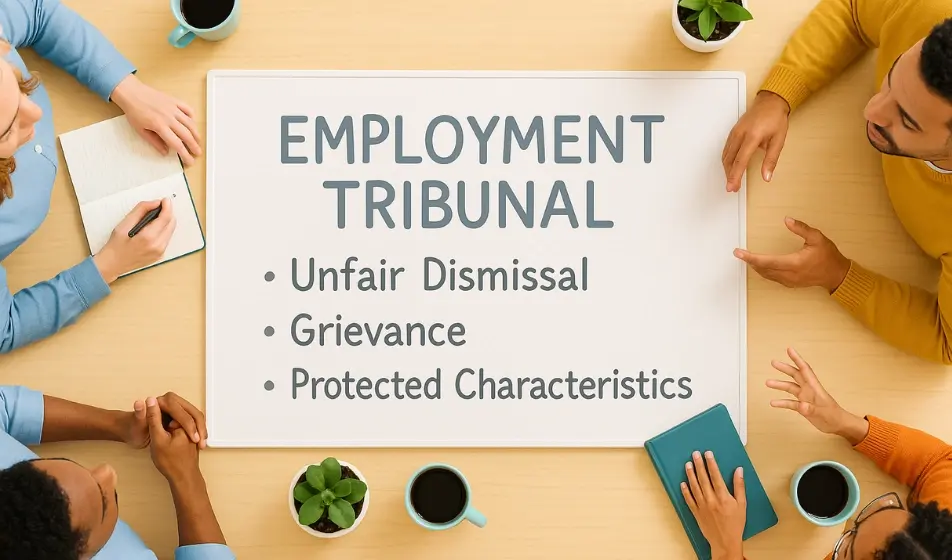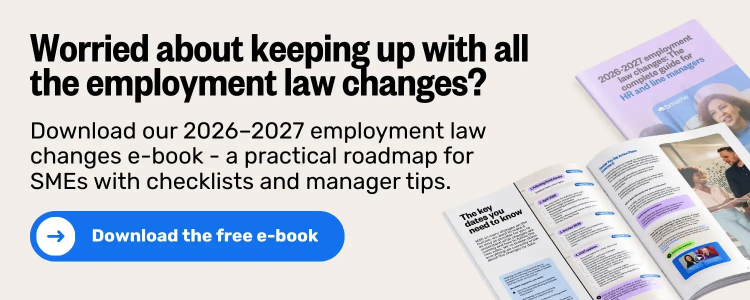In today’s business landscape, understanding how to avoid an employment tribunal is crucial for small business owners and HR leaders. We delve into expert advice from Breathe Partner Dan Jenkins, Managing Director of Access2 HR.
Learn how to manage employee relations effectively and mitigate the risk of potential legal disputes.
Important: Understanding the calculation of statutory awards, including the employee's gross weekly pay at the time of dismissal, is crucial for establishing compensation limits and payment calculations.
Understanding employment tribunals and unfair dismissal claims
What is an employment tribunal?
The basics
Employment tribunals are judicial bodies that hear disputes between employers and employees regarding employment rights. Employment tribunals also deal with claims related to statutory rights, which protect employees from unfair treatment. It is crucial to follow a fair process when dismissing an employee to avoid potential legal claims.
Types of claims
Common claims include: unfair dismissal, discrimination, unpaid wages, and breaches of contract. The Employment Rights Act outlines specific categories for fair dismissal and the legal rights employees and employers have in these situations.
A crucial factor in determining the fairness of a dismissal is whether the employer has acted reasonably in dismissing the employee and it's important the employee has been treated in the same way as other employees in similar situations.
Additionally, being a trade union member and participating in trade union activities qualifies as an 'automatically unfair' reason for dismissal.
Constructive dismissal occurs when an employee is effectively forced to resign due to the employer's conduct, making their position untenable.
The importance of avoiding tribunals
Financial and reputational impact
- Legal fees: Going to tribunal often involves having legal representation, which can incur significant legal fees. The costs could add up, especially if the case involves legal teams or multiple hearings.
- Potential compensation payouts: According to the latest available government statistics the average award for an unfair dismissal case at a tribunal is £13,749. In extreme cases, payouts can reach up to £800,000 to £900,000, (although these are in quite unique situations). For sex discrimination claims, the highest reported award was just under a million pounds.
- Disruption and internal costs: Dealing with a tribunal creates a huge amount of work internally and a drain on management time.
- Business reputation: Any involvement in a tribunal can negatively affect how a business is perceived. It’s a public process and could signal poor HR practices or management issues to clients, partners, and future potential employees, potentially damaging the business’s standing in the industry.
Both the financial costs and potential reputational damage underscore the importance of good HR practices and thorough documentation to avoid reaching this stage in the first place.
Key reasons employers lose tribunal cases
Lack of documentation
It’s crucial to remember that "evidence wins tribunals." Written, contemporaneous evidence in particular. It’s essential to maintain comprehensive records of all employee interactions. This means documenting everything from meetings and disciplinary actions to any important verbal discussions that have taken place.
Having well-organised and thorough documentation can greatly increase your chances of success if you ever find yourself facing an employment tribunal. It provides clear evidence of the procedures you’ve followed and demonstrates that you’ve acted fairly and reasonably.
Remember, the more evidence you have to back up your decisions, the stronger your position will be in any legal setting.
Failure to follow procedures
Staying on top of procedures for disciplinary actions and terminations is crucial for several reasons.
- Fairness and consistency: Handling grievances and disciplinary actions consistently ensures that all employees are treated fairly, no matter their position within the company. This consistency helps in maintaining a fair workplace environment and reduces the risk of claims of unfair treatment.
- Legal compliance: It’s important to follow the ACAS Code of Practice, which is key to ensuring that all disciplinary procedures comply with legal standards. Not following these can lead to legal repercussions and potential tribunal claims.
- Effective documentation: Accurate documentation of all procedures and employee interactions is vital. This documentation serves as evidence in the event of a tribunal claim, demonstrating that a fair process was followed. It also helps in managing records efficiently, which is crucial for compliance and defending against potential legal challenges.
- Resolution and communication: Establishing clear communication channels during any grievance or disciplinary process ensures that employees understand the issues, the process being followed, and the reasons for any actions taken against them. This can facilitate early resolution of disputes and prevent escalation.
- Prevention of escalation: By addressing disciplinary issues promptly and effectively, organisations can often nip potential problems in the bud before they escalate into larger disputes that could lead to costly and time-consuming tribunals.
Inconsistency in policy application
To make sure workplace policies are applied consistently across all employees and to help prevent claims of unfair treatment, it’s essential to have a robust strategy in place. Here are some tips to help:
- Clear communication: Make sure that all employees are aware of the policies and procedures from day one. You can do this by providing a comprehensive employee handbook that outlines company policies, expectations, and procedures.
- Regular training: Conduct regular training sessions or briefings to keep employees and managers updated on any changes in policies or new employment laws. This ensures everyone is on the same page and reduces misunderstandings.
- Document everything: Accurate and thorough documentation is vital. Keep records of all communications, performance reviews, disciplinary actions, and grievance procedures. Lack of proper documentation can be a significant issue during tribunals.
- Apply policies equally: Whether dealing with a new apprentice or the managing director, everyone should be treated according to the same set of rules. Maintain consistency to ensure fairness.
- Prompt action: If an issue arises, address it quickly. Early intervention can prevent small problems from becoming major disputes.
- Impartial decision-making: When it comes to handling grievances or disciplinary actions, ensure that an impartial manager handles the process. This helps maintain objectivity and fairness.
- Use technology: Leverage HR software like Breathe to manage employee data, document interactions, and keep records. This technology can streamline processes and ensure compliance with privacy laws.
- Encourage open communication: Foster an environment where employees feel comfortable voicing their concerns without fear of unfair repercussions. Open dialogue is key to understanding issues before they escalate.
By following these tips, organisations can foster a fair and consistent workplace, as well as reduce the risk of potential claims of unfair treatment.
Implementing effective HR practices
Develop clear policies
To establish comprehensive employment policies that align with current legislation, consider the following steps:
- Understand legal requirements: Familiarise yourself with the Employment Rights Act 1996 and other relevant employment laws to ensure your policies are legally compliant.
- Cover key areas: Develop policies that address key areas like unfair dismissal, discrimination, grievances, and disciplinary procedures. Ensure policies are clear about conduct, capability, redundancy, and statutory rights.
- Consistency and fairness: Ensure policies are consistently applied to all employees, regardless of their position. This includes fair procedures for grievances and disciplinary actions, as stated in the ACAS Code of Practice.
- Record keeping: Maintain accurate and up-to-date records for all employee-related issues. Breathe can centralise documentation and ensure GDPR compliance.
- Employee communication: Clearly communicate the policies to all employees. Provide access to updated handbooks and ensure employees acknowledge understanding of company rules and procedures.
- Regular updates: Regularly review and update policies to reflect changes in legislation and organisational needs. You can contact Access2 Human Resources or the Breathe Partners, if you need to ensure compliance and effectiveness.
Training and development for managers
Training managers in HR best practices is important to handle employee issues effectively. It ensures managers can address poor conduct or performance promptly, preventing escalation into major disputes and fostering a fair, consistent work environment.
This approach helps maintain good working relationships, open communication, and trust. Following proper procedures in grievance and disciplinary processes, helps organisations stay compliant with legal obligations and reduces the risk of facing employment tribunal claims.
Having knowledgeable managers can save time, money, and promote a positive organisational culture.
Addressing employee issues promptly
Encouraging open communication
Fostering a culture of open dialogue is crucial in preventing disputes from escalating. When you address issues promptly, it helps to preserve good working relationships and fosters open communication, building trust and fairness across the organisation.
Employees feel comfortable sharing their concerns before they escalate into major disputes, reducing the likelihood of grievances and disciplinary actions. This proactive approach can save time and resources, and ensures everyone understands the expectations and any corrective actions needed promptly.
Conducting thorough investigations
To conduct unbiased investigations into employee grievances, follow these steps:
- Acknowledge the complaint: Provide written confirmation of receipt to the employee to assure them their grievance is being taken seriously.
- Establish communication: Set clear communication channels with the employee to explain how their grievance will be handled.
- Thorough investigation: Gather all relevant facts and evidence, including witness statements and any pertinent documentation.
- Conduct a formal grievance meeting: Schedule a meeting in a neutral setting to allow the employee to present their case. The employee should have the right to be accompanied by a colleague or trade union official. The manager conducting the meeting should remain impartial throughout.
- Make a fair decision: Based on the evidence, reach an objective decision and communicate it clearly in writing to the employee, ensuring they understand the process and reasoning.
- Right to appeal: Provide the employee the opportunity to appeal the decision if they are unsatisfied, and ensure a different manager, who has not been involved, handles the appeal.
Following this structured approach ensures fairness and compliance with legal obligations.
Handling grievance and disciplinary procedures correctly
Steps in the grievance process
Here are the key steps to handle grievances impartially and promptly:
- Acknowledge the complaint: As soon as a grievance is raised, acknowledge it in writing to the employee, ensuring them that their concerns are being taken seriously.
- Clear communication: Establish open communication channels and assure the employee of the process that will be followed.
- Conduct an investigation: Gather all relevant evidence, review documents, collect witness statements, and gather additional information to make an informed decision.
- Schedule a grievance meeting: Set up a formal meeting in a neutral and confidential setting to encourage open dialogue. Allow the employee to bring a work colleague or trade union official for support.
- Make an objective decision: Evaluate the facts and evidence impartially. The decision should be based on facts, not personal opinion, and should be communicated clearly to the employee.
- Offer a right to appeal: If the employee is not satisfied with the decision, provide them the right to appeal, which should be heard by a different, impartial manager.
Managing disciplinary actions
Fair and transparent disciplinary procedures are vital in any organisation as they ensure that all employees are treated consistently and justly, complying with legal obligations. Such procedures help to preserve good working relationships and foster trust within the workplace.
They also set clear standards for acceptable behaviour, preventing issues from escalating into more significant disputes. By following a structured approach, including thorough investigations and unbiased decision-making, businesses can not only protect themselves from costly legal claims but also create a positive work environment where employees feel respected and valued.
Centralising employee documentation
Breathe HR software is a great tool for securely storing and managing essential employee documents. It streamlines the HR workflow by centralising all your employee records, from performance reviews to holiday bookings, in one safe location.
The self-service portal means employees can easily manage their personal details, while also giving managers a clear view of everyone’s records without sifting through endless paperwork.
Plus, everything’s up to date with employment law, ensuring your data is protected and compliant with privacy regulations. It’s not just about saving time; it’s about keeping everything organised and secure with ease.
Ensuring data security and compliance
In today’s digital age, data privacy is a crucial aspect of HR practices. Organisations must prioritise strong security measures to prevent unauthorised access and data breaches, ensuring compliance with privacy laws.
Breathe HR software supports this by facilitating centralised data storage and management, which helps maintain data integrity (and it’s ISO-27001 security accredited - one of the safest and highest standards of security).
It automates tasks like record-keeping while providing transparency and accessibility through a self-service portal. This not only enhances efficiency but also engages employees by keeping them informed, ultimately ensuring HR processes align with existing GDPR regulations.
Custom reports and analysis
The analytical features in Breathe can be instrumental in providing valuable insights into workplace trends and behaviours. By analysing data such as absence patterns, for instance, you can identify issues like employees frequently being off sick on specific days, like Fridays.
This kind of insight allows you to address potential problems early, taking proactive steps to manage and rectify issues before they escalate into larger disputes. Analytical capabilities like this, empower businesses to maintain better workforce management and foster a fair and consistent work environment.
Preparing for the new Employment Rights Bill
The new Employment Rights Bill is set to introduce significant changes to employer practices concerning dismissal rights. One major shift is the proposal to remove the two-year continuous service requirement for employees to claim unfair dismissal.
This change means that employers must follow a full and fair process for dismissing any employee, regardless of their length of service, making it a day-one right.
The Bill also discusses implementing a statutory probation period, likely up to nine months, during which a more streamlined dismissal process would apply.
These changes necessitate that employers be more vigilant in following procedures and maintaining documentation to mitigate risks of unfair dismissal claims.
Understanding dismissal
Dismissal refers to the termination of an employee’s contract of employment, which can be a complex and sensitive issue in employment law. It’s essential for employers to understand their obligations and follow a fair procedure to avoid claims of unfair dismissal.
The reasonableness of an employer's actions can vary based on the specific circumstances of each case. Dismissal for reasons associated with health and safety issues can be classified as 'automatically unfair'.
Understanding one's legal rights within the job is crucial for navigating dismissal cases. Additionally, being dismissed for requesting legal rights at work, such as being paid minimum wage, is considered automatically unfair.
Employees who feel they have been unfairly dismissed can make a claim to an employment tribunal, which can result in compensation or reinstatement.
To claim unfair dismissal, an employee must have been employed for a qualifying period, typically two years, although there are exceptions for automatically unfair reasons such as health and safety issues or trade union activities.
Types of dismissal
There are several types of dismissal, including unfair dismissal, constructive dismissal, and automatic unfair dismissal.
- Unfair dismissal occurs when an employer terminates an employee’s contract without a fair reason or fails to follow a fair procedure. Legal support for senior executives facing unfair dismissal claims is crucial due to the complexity and high stakes involved. 'Other substantial reason' is a legal ground for dismissal that requires the employer to demonstrate a valid reason for termination.
- Constructive dismissal happens when an employer’s conduct forces an employee to resign, which can be considered a dismissal in law.
- Automatic unfair dismissal occurs when an employee is dismissed for a reason that is inherently unfair, such as pregnancy, whistleblowing, or health and safety concerns. While an employer can dismiss an employee during maternity leave, it cannot be the reason for the dismissal. The Employment Rights Act necessitates that employers act reasonably in all the circumstances when deciding to dismiss an employee.
Employers must be aware of these types of dismissal to ensure they are acting lawfully and following a fair process.
Employment contracts
Employment contracts play a crucial role in determining the terms and conditions of employment, including the notice period, pay, and benefits. Employers must ensure that employment contracts are clear, concise, and comply with employment law.
Employers must demonstrate they had a good reason for dismissing an employee if the dismissal is not explicitly covered by legal grounds. If a claim is successful, a tribunal may order the employer to reinstate the employee in their old job or offer different employment.
The significance of the employer's actions in determining compensatory awards for unfair dismissal claims is crucial. Understanding legal terms such as constructive dismissal and unfair dismissal is important for navigating potential claims against an employer.
Employees should also understand their contractual rights and obligations to avoid disputes and potential claims.
A well-drafted employment contract can help prevent tribunal claims by outlining the expectations and responsibilities of both parties. Employers should seek legal advice to ensure their employment contracts are up-to-date and compliant with the latest employment laws and regulations.
Preventing tribunal claims
Preventing tribunal claims requires employers to be proactive and ensure they are following a fair procedure in all aspects of employment law. This includes providing clear policies and procedures, training managers and employees, and ensuring that all decisions are made fairly and consistently.
Employers should also be aware that a fixed-term contract has specific conditions under which an employee may be dismissed before the contract ends. Additionally, the Equality Act 2010 provides protection against unfair treatment based on protected characteristics.
The tribunal believes the reasonableness of the employer's actions plays a crucial role in determining whether the dismissal was fair or unfair. Participating in official industrial action is a protected right and cannot be a reason for dismissal.
Employers should also be aware of the qualifying period for unfair dismissal claims and take steps to prevent automatically unfair dismissals. By following a fair procedure and being aware of their obligations under employment law, employers can reduce the risk of tribunal claims and minimise the risk of costly compensation awards.
Employees who feel they have been unfairly dismissed can seek advice from a trade union representative or legal advisor to determine the best course of action.
Best practices for employers
Employers can take several steps to minimise the risk of unfair dismissal claims. First, they should ensure that they are following fair procedures, as outlined in the Acas code of practice.
This includes providing employees with clear disciplinary and grievance procedures and ensuring that employees are aware of their rights and responsibilities.
Employers should also take steps to prevent discrimination and ensure that employees are treated fairly and consistently.
Additionally, employers should keep accurate records of employee performance, disciplinary actions, and grievances, as these can be used as evidence in an unfair dismissal claim.
By following best practices, employers can reduce the risk of unfair dismissal claims and create a positive and productive work environment.
You can watch the full webinar 'How to avoid an employment tribunal' on-demand.
.webp)
Author: Dan Jenkins
Dan Jenkins is a Breathe Partner and the Managing Director of Access2 Human Resources. After a management career in hospitality Dan qualified in 2006 as a Graduate Member of the Chartered Institute of Personnel and Development with a Level 7 Certificate specialising in employment law. Since 2005 he has worked in Head of HR and HR Director roles in the hospitality, retail, distribution and professional services sectors and has over 23 years experience of Employment Tribunals including successfully representing both Respondents and Claimants. In 2014 Dan set up his own HR Consultancy business, Access2 Human Resources, which currently employs 12 people and specialises in supporting small businesses and charities. In 2024 the business acquired Personnel Placements, a recruitment business based in Salisbury. With his business experience and more than 20 years Employment Tribunals work, both as a member and representing respondents, Dan is well placed to advise employers on how to minimise the risk of tribunal claims through the introduction and implementation of effective HR policies and management practices.





